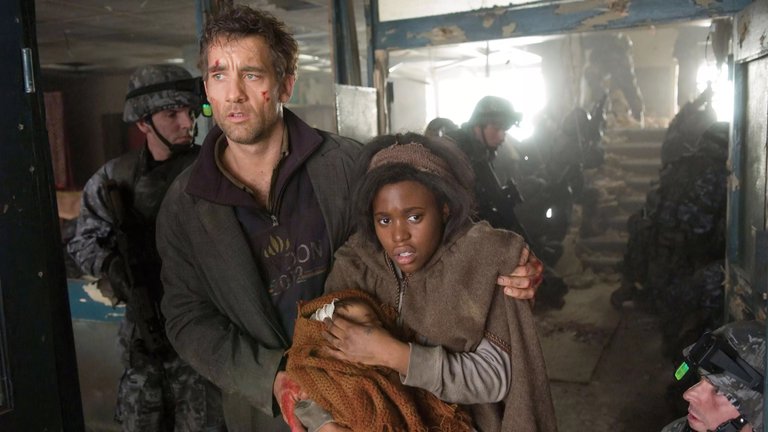
The passage of time can significantly influence the reputation of science fiction films, particularly those set in a near-future context. In some rare instances, this time span can be relatively brief, leading to effects that are both beneficial and detrimental to a film's standing. One such example is Children of Men, a 2006 film directed by Alfonso Cuarón.
The film is based on the 1992 novel by British author P.D. James, who was primarily known for her crime fiction until this point. Set in England in the near future, the film begins on November 16, 2027. It portrays a world grappling with a disturbing phenomenon: for roughly two decades, women have inexplicably lost the ability to conceive. This widespread infertility has led humanity to the brink of extinction, with the absence of children tearing apart the social fabric of many societies and resulting in widespread chaos. The United Kingdom stands as one of the few countries that has managed to maintain a semblance of order by establishing an increasingly authoritarian regime. However, this stability attracts desperate immigrants from around the globe, leading the government to adopt harsh and oppressive measures to control the influx.
The protagonist, Theo Faron, played by Clive Owen, is a cynical government bureaucrat who becomes embroiled in a radical anti-government movement known as The Fishes. The group is led by Julian Taylor (Julianne Moore), Theo’s estranged wife. Julian enlists Theo’s help to secure papers for Kee (Clare-Hope Ashitey), an African immigrant who is revealed to be pregnant—the first woman to conceive in nearly two decades. As Theo attempts to protect Kee from both the government and the ruthless leader of The Fishes, Luke (Chiwetel Ejiofor), he embarks on a perilous journey to deliver her to the Human Project, a group of scientists seeking a cure for global infertility.
The concept of humanity facing extinction not through war or sudden catastrophe, but rather through the mundane reality of infertility, is not entirely new to science fiction. A notable example is the 1983 Italian exploitation film 2019: After the Fall of New York, which Cuarón pays homage to in one of the scene. However, while the premise is fascinating, Cuarón's film does not fully exploit its potential. Unlike James, who meticulously crafted a world devoid of children and examined its psychological, cultural, and economic implications, Cuarón simplifies these elements into recognisable tropes of dystopian society. The film shifts focus from the broader existential crisis of humanity to the plight of immigrants seeking refuge in a prosperous yet increasingly oppressive Western nation. Consequently, Children of Men emerges not as a stark vision of a disturbing future but rather as a slightly altered reflection of the present. In 2006, it resonated with audiences as a critique of human rights abuses under the guise of the Global War on Terror, much like the contemporaneous film V for Vendetta.
At its premiere, Children of Men garnered attention not so much for its thematic content but for its stylistic execution. Cuarón, in collaboration with cinematographer Emmanuel Lubezki, crafted a visually arresting and bleak portrayal of a recognisable yet dystopian Britain. The film is particularly noted for its long tracking shots, which immerse viewers in the dark world and lend a visceral quality to the brutal acts of violence depicted. These scenes, devoid of conventional editing, heighten the impact of the narrative, showcasing Cuarón's directorial prowess. However, there are moments when this stylistic choice borders on self-indulgence. Cuarón's subsequent film, Gravity (2013), demonstrates a more consistent and effective application of similar techniques.
The performances in Children of Men are commendable, though Clive Owen's portrayal of Theo lacks a certain memorability. Julianne Moore's character, while pivotal, does not leave a lasting impression due to her limited screen time. In contrast, veteran actor Michael Caine shines as Jasper, an aged hippie who provides moments of comic relief in an otherwise grim narrative. His character serves as a reminder of the humanity that persists even in the bleakest of circumstances.
Despite receiving critical acclaim, Children of Men struggled at the box office, a fate that can be attributed to its unrelenting subject matter. However, its reputation has grown significantly in recent years, particularly as discussions surrounding demographic decline and the effects of uncontrolled immigration have taken centre stage in public discourse. The film's exploration of these themes has proven increasingly relevant, prompting audiences to reconsider its implications in the context of contemporary societal challenges.
RATING: 7/10 (+++)
Blog in Croatian https://draxblog.com
Blog in English https://draxreview.wordpress.com/
InLeo blog https://inleo.io/@drax.leo
Hiveonboard: https://hiveonboard.com?ref=drax
Rising Star game: https://www.risingstargame.com?referrer=drax
1Inch: https://1inch.exchange/#/r/0x83823d8CCB74F828148258BB4457642124b1328e
BTC donations: 1EWxiMiP6iiG9rger3NuUSd6HByaxQWafG
ETH donations: 0xB305F144323b99e6f8b1d66f5D7DE78B498C32A7
BCH donations: qpvxw0jax79lhmvlgcldkzpqanf03r9cjv8y6gtmk9
Posted Using InLeo Alpha